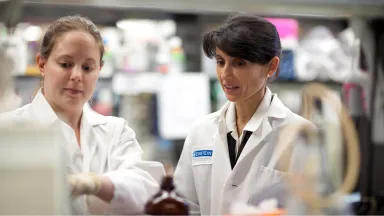
Lloyd D. Fricker, Ph.D.
- Professor, Department of Molecular Pharmacology
- Professor, Dominick P. Purpura Department of Neuroscience
Area of research
- Neuropeptides and other peptides that function in intercellular and intracellular signaling; peptidases that generate biologically active peptides. ,
Phone
Location
- Albert Einstein College of Medicine Jack and Pearl Resnick Campus 1300 Morris Park Avenue Forchheimer Building 240 Bronx, NY 10461
Research Profiles
Professional Interests
Peptides play many important physiological roles in most organisms. Neuropeptides and peptide hormones function in cell-cell signaling and are involved with a wide variety of biological functions including feeding and body weight regulation, fear, anxiety, pain, circadian rhythms, memory, reward mechanisms, and many others. We have discovered a number of novel peptides using mass spectrometry-based peptidomic techniques. Some of these are neuropeptides that function in cell-cell signaling that control feeding/body weight. Other novel peptides found in the peptidomic analyses are produced from cytosolic proteins, and some of these peptides are secreted and bind to extracellular receptors; these are termed “non-classical” neuropeptides, a novel class of cell-cell signaling molecule.
In addition to peptides, we are also interested in enzymes that modify peptides/proteins. Our laboratory has discovered a dozen different carboxypeptidases and we are currently working towards determining their functions. One carboxypeptidase, which we named carboxypeptidase E (CPE), is responsible for the biosynthesis of most peptide hormones (such as insulin) and neuropeptides (such as enkephalin). We identified a mouse mutation (originally named fat) that does not produce active CPE due to a point mutation; these mice are obese, sterile, hyperglycemic, and have neurological impairments. Recently, we have developed a conditional knock-out mouse that allows for the elimination of CPE activity in specific cell types. We are currently using this mouse line to determine which cells are involved in abnormal physiology and behaviors of the global Cpe KO mice (e.g. obesity, depression, anxiety). In addition, we are using peptidomic approaches to identify the peptides in these cell types.
Selected Publications
Fricker, L.D., Proteasome inhibitor drugs. Annual Review Pharmacology and Toxicology. in press, 2019.
Fritz R, Mukherjee A, Zaghi S, Agalliu I, Jindal S, Tashima AK, Fricker LD, Davies KP., Identification and characterization of RSIY-11, a novel seminal peptide derived from semenogelin-1, which acts as a neutral endopeptidase inhibitor modulating sperm motility. J Assist Reprod Genet. 2019. doi: 10.1007/s10815-019-01524-8.
Dasgupta S, Fishman MA, Castro LM, Tashima AK, Ferro ES, Fricker LD., Effect of protein denaturation and enzyme inhibitors on proteasomal-mediated production of peptides in Human Embryonic Kidney Cells. Biomolecules. 2019 May 28;9(6). pii: E207. doi: 10.3390/biom9060207.
Fricker L., Quantitative peptidomics: General considerations. Methods Mol Biol. 2018; 1719:121-140.
Fricker LD., Carboxypeptidase E and the identification of novel neuropeptides as potential therapeutic targets. Adv Pharmacol. 2018; 82:85-102.
Tashima AK, Fricker LD., Quantitative peptidomics with five-plex reductive methylation labels. J Am Soc Mass Spectrom. 2018; 29(5):866-878.
Fricker LD, Devi LA., Orphan neuropeptides and receptors: Novel therapeutic targets. Pharmacol Ther. 2018; 185:26-33.
Garcia-Pardo J, Tanco S, DÃaz L, Dasgupta S, Fernandez-Recio J, Lorenzo J, Aviles FX, Fricker LD., Substrate specificity of human metallocarboxypeptidase D: Comparison of the two active carboxypeptidase domains. PLoS One. 2017; 12(11):e0187778.
Berezniuk I, Rodriguiz RM, Zee ML, Marcus DJ, Pintar J, Morgan DJ, Wetsel WC, Fricker LD., ProSAAS-derived peptides are regulated by cocaine and are required for sensitization to the locomotor effects of cocaine. J Neurochem. 2017; 143(3):268-281.





